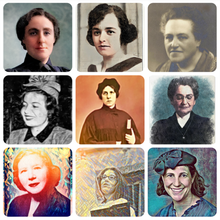
Women rabbis and Torah scholars are individual Jewish women who are recognized for their studies of the Jewish religious tradition and often combine their study with rabbinical ordination. Ordination of women has grown since the 1970s with over 1,200 Jewish women receiving formal ordination (see § Membership by denomination). The majority of these women are associated with Progressive Jewish denominations (Reform, Conservative, and others). In Orthodox Judaism, the matter of ordination is more complex. Although a significant number of Orthodox women have been ordained as rabbis,[1][2] many major Orthodox Jewish communities and institutions do not accept the change.[3][4][5] In an alternative approach, other Orthodox Jewish institutions train women for various Jewish religious leadership roles and may entail training in Jewish Law although no formal rabbinic ordination is granted. Instead, alternate titles are used.[6][7] Yet, despite this alteration in title, these women are often perceived as equivalent to ordained rabbis.[8]
Notwithstanding early examples in Jewish biblical and rabbinic tradition, such as Deborah and Bruriah, for much of Jewish history the recognizable roles of the rabbi (rav), preacher (darshan), and Torah scholar (talmid chacham) were almost exclusively limited to Jewish men. With few, rare historical exceptions, such as the case of Asenath Barzani, Jewish women were first offered the possibility for ordination or an equivalent role beginning in the 1920s,[9] but it was not until the 1970s when this became widely accepted.[10] Early efforts to ordain women date to the late nineteenth and early twentieth century. A small cohort of women are recorded as being candidates for ordination, however, eventually nearly all were denied ordination.[11] During the 1930s, Regina Jonas of Germany became the first recorded instance of a Jewish woman in modern times receiving formal rabbinical ordination.[12] Subsequent decades saw women-led campaigns within Reform Judaism for the recognition of women rabbis.[13][14] These campaigns also coincided with the influence of second-wave feminism on Western society. And these efforts culminated in the 1972 ordination of Sally Priesand at Hebrew Union College, the flagship institution of Reform Judaism. Subsequently, women rabbis were ordained by all other branches of Progressive Judaism.[15] The formal ordination of women rabbis in Orthodox Judaism began in the 2000s, however its acceptance within Orthodoxy is still a highly contested issue.[16][17] Nonetheless, in the early 2020s, the State of Israel approved legislation to allow all Jewish women to qualify for the state rabbinic examinations, effectively giving Orthodox women a credential equivalent to those of male rabbis, however, the uses of this credential is limited to certain rabbinic roles.[18]
- ^ "Class of 2015". Yeshivat Maharat. Archived from the original on December 5, 2015. Retrieved January 5, 2016.
- ^ Rabbi Lila Kagedan (November 25, 2015). "Why Orthodox Judaism needs female rabbis". The Canadian Jewish News. Archived from the original on November 26, 2015.
- ^ "Orthodox Union bars women from serving as clergy in its synagogues – J". Jweekly.com. February 3, 2017. Archived from the original on February 20, 2017. Retrieved February 4, 2017.
- ^ "Breach in US Orthodox Judaism grows as haredi body rejects 'Open Orthodoxy' institutions". The Jerusalem Post. November 3, 2015. Archived from the original on November 7, 2015.
- ^ Josh Nathan-Kazis (November 3, 2015). "Avi Weiss Defends 'Open Orthodoxy' as Agudah Rabbis Declare War". The Forward. Archived from the original on November 7, 2015.
- ^ Raucher, Michal (December 15, 2021). "Orthodox Jewish women's leadership is growing – and it's not all about rabbis". The Conversation.
- ^ "Synagogue appoints first female halachic adviser". The Jewish Chronicle. Archived from the original on December 23, 2012.
- ^ Auman, K. (2016). Feminism, Egalitarianism, Judaism: Where Are We Headed?. Tradition: A Journal of Orthodox Jewish Thought, 49(1), 43–48.
- ^ Dämmig, L., & Klapheck, E. (2006). Debora's Disciples: A Women's Movement as an Expression of Renewing Jewish Life in Europe. Sandra Lustig et Ian Leveson (éds.), Turning the Kaleidoscope. Perspectives on European Jewry, New York, Berghahn Books, 147–163.
- ^ Di Segni, R. "La Donna Rabbino": The Chief Rabbi of Rome Considers the Question of Women in the Rabbinate. Translated by Daniel A. Klein. Originally published in Scritti Sull'ebraismo in Memoria di Emanuele Menachem Artom, edited by Sergio J. Sierra and Elena Lea Artom (Jerusalem, 1996) (pp. 175–187).
- ^ Cite error: The named reference
nadell5was invoked but never defined (see the help page). - ^ "Regina Jonas | Jewish Women's Archive". Jwa.org. Archived from the original on April 17, 2012. Retrieved May 3, 2012.
- ^ Cite error: The named reference
evans1was invoked but never defined (see the help page). - ^ Cite error: The named reference
evans2was invoked but never defined (see the help page). - ^ "Orthodox Women To Be Trained As Clergy, If Not Yet as Rabbis –". Forward.com. May 21, 2009. Archived from the original on December 6, 2011. Retrieved May 3, 2012.
- ^ Cite error: The named reference
nyt210806was invoked but never defined (see the help page). - ^ Cite error: The named reference
Heebwas invoked but never defined (see the help page). - ^ First women pass Israel's rabbinical exams but don't expect to see the leading prayers. Plus61J media. Accessed January 31, 2023.